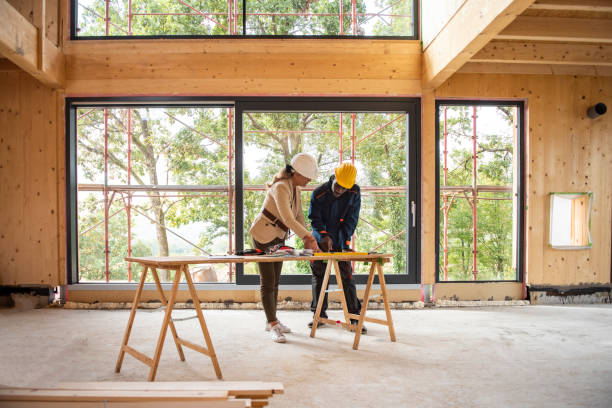
How to Choose the Right General Contractor for Your Project
Choosing a contractor for your general construction process is one of the things that can make or break a construction project. It can be constructing a new home, renovating a space, or undertaking commercial construction projects. The right choice means that the project goes according to budget considerations, meets time requirements, and delivers quality work. Choosing the best contractor, however, has been tough. This guide will take you through the process and key considerations to help you find what you need.

What is a General Contractor?
The general contractor coordinates the daily activities of a construction project. He coordinates with different subcontractors, sources materials, supervises labor, and ensures timely completion and on-budget delivery as agreed upon. The general contractor will also engage in activities to secure needed permits, ensure observance of local building codes, and coordinate the safety of the whole project.
A general contractor is in charge of being the client’s single point of contact and taking care of the logistics and coordination needed to bring the project to life. Therefore, hiring a good general contractor is very important for the success of your project.
Why You Need a Local General Contractor
A local general contractor has many benefits. He is well aware of the regional regulations, building codes, and suppliers. He also tends to have great relationships with the subcontractors, so communication could be easier and even cheaper for both labor and materials.
This will, in turn, allow local contractors the convenience of holding on-site meetings and inspections, allowing them to provide a more hands-on approach that can especially benefit bigger or more complicated projects.
Step 1: Define Your Project Needs
Define your project needs Before finding the best general contractor for your work, you need to define your project needs. This ranges from specifying the scope of the project to determining your budget and timelines. With this knowledge, you can then clearly communicate the details to prospective contractors while giving them an avenue to provide you with accurate quotes and proposals.
Considerations
- Project Type: Are you building a new house, renovating the kitchen, or doing a commercial? Budget: How much are you going to spend? You also need to know your contingency budget for unexpected expenses.
- Timeline: You also need to know the ideal start and end times for the project. Quality Expectations: Every contractor has specialized tastes; some may make very high-end finishes while others are ‘cost-effective.’
Knowing what your project needs, you can find a contractor who specializes in the work you propose.
Step 2: Thorough Investigation
Following the collection of as much information as you can about your project, it is time to locate contractors. Word of mouth from your friends, family, or even colleagues can come in handy; however, word of mouth must not be your only source for it. In fact, a better approach could be to use the internet by surfing your local business directories and review platforms and searching through your contractor’s website so that you can pool a list of potential candidates.

The following are some important considerations:
- Licensing and Insurance: The general contractor should have the right licenses and appropriate insurance coverage to protect you from liability. Good general contractors should also provide up-to-date documentation for checking and verification.
- Experience: Has the contractor done similar work before? Ideally, you want a contractor who has completed similar jobs before.
- Reputation: Check online review websites, testimonials, awards, or any other professional recognitions to assess the professionalism with which they conduct quality work. You want someone with a proven reputation in your community.
- Portfolio of Past Work: This is an all-important portfolio that will help you get a good feel for the contractor’s capabilities and style.
Applying these selection criteria will narrow the list to contractors who qualify and have the experience for the specific project that comes to mind.
Step 3: Meet with Potential Contractors
Now that you’ve narrowed it down, you should meet with potential contractors to gauge their communication style, experience, and general professionalism.
Here are some questions you ask during the meeting:
- Are you licensed and insured? – always ask this before going further.
- What experience do you have with this type of project? Try to determine their experience so that you can pinpoint the right one.
- Can you provide some references? This is fine for any good contractor because no sane contractor would be afraid to give references to previous customers.
- What is your approximate timeline for completing the project? – Their proposal for their timeline must then be compatible with your expectations.
- Who will oversee the project? Most contractors have a project manager or supervisor overseeing site activities on a day-to-day basis. Find out who your contact will be.
- How do you normally handle an unexpected problem or a delay? – Most construction site projects are bound to face some unexpected problems. Ask how they generally handle such situations.
Determine who is answering your questions and whether he is transparent and open about his processes.
Step 4: Compare Bids and Estimates
Once you have met with several contractors, ask them to produce detailed bids or estimates. A good bid should include at least a cost breakdown of labor, material, and additional fees. In most cases, extremely low bids indicate that this is done using cheap materials or shortcuts.
Comparing Any Competitive Bids Compare price. While the lowest general contractor can be tempting, the cheapest is not necessarily the best. The price should match the budget and reflect the quality of work expected.
- Scope of Work: The estimate should clearly show the work the contractor would undertake. Ensure nothing creeps in that would not have been there in the first place.
- Timeline: Will it correspond to what you expect of timelines? You should factor in the delays, as for each delay you incur, you incur more. Hence, you have to consider this when judging the contractor’s offer.
- Payment Terms: The contractor will normally require a deposit but raise alarm bells if he demands a huge chunk of the cost of the project before stepping into action. Agree on a payment schedule based on the project milestones.
Compare the bids to choose the contractor with the best performance in terms of price, quality, and timeline.

Why you shouldn’t take the cheapest way
Of course, affordability is the number one concern, but the Most Affordable General Contractor doesn’t have to be the cheapest. Sometimes, he can underbid or be too low, which is why he cuts corners, so to speak. The work done may be of little quality or may even reveal errors that only come forth in the project.
Rather, look for one that offers value for money in the form of good quality service at reasonable and affordably charged prices. The goal is to have the best value for the buck, not the lowest cost.
Step 5: Refer to References and Reviews
Commit only to the contractor once you have checked the references. Let you call your past customers so you can see just how much experience you have with the contractor. Questions to ask include:
- Was the job completed on time and within budget?
- Did the contractor expect any overruns on the job?
- Was communication given throughout the project?
- Will you hire them again?
Also, look out for red flags or persistent problems from most of the reviewers on the internet. Look for trending complaints rather than a single complaint. A contractor with a history of continuously satisfied customers is much more likely to be able to meet your requirements.
Step 6: Sign a Detailed Contract
The moment you have picked your Best General Contractor, you start drafting and signing a contract. So, the most critical thing about the contract is that it fully protects all parties involved in the project. And the agreement with which everyone has concerns regarding it, then you will have it.
Things to include in your contract are:
- Scope of Work: This will be a clearly defined description of work to be undertaken
- Project Timeline: The start and completion dates of the projects.
- Payment Schedule: Terms and payment milestones.
- Warranties: What is covered by warranties on work and materials?
- Change Orders: Have a process for any changes to the scope of work.
- Termination Clauses: Conditions for contract termination.
Step 7: Stay Engaged During the Project
Your involvement does not stop after signing the contract. One of the activities that keep your project on track is a regular follow-up with your contractor. Schedule check-ins regularly to track progress, ask your questions, and begin to see if things are being done right.
If you experience any possible problems or deviations from the actual plan, then you have to consult your contractor immediately. These aspects require proactive consultation since even small problems can be magnified into huge issues.
Reason 2: Clear Communication
Communication is the key to your project’s success. Decide early how you will communicate with the contractor—whether through calls, emails, or even an in-person meeting. Decide what expectations are for regular updates and progress reports so that you are always properly apprised of how the project is going.

Conclusion
After all, the general contractor will make or break the project. A little legwork in researching candidates, hosting some over-for meetings, comparing bids, and clear communication will put you in the best position to select the contractor who will help bring your vision to life within budget and on time.
This means the best general contractor for your project is not necessarily the one who offers you the lowest price but, rather, the one who delivers quality work, meets deadlines, and maintains full transparency throughout the process. The subsequent guide’s steps should help you determine the right contractor for your next project.
